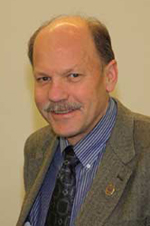February 2012

Nicholas S. Hill, MD
The ATS recently suffered a severe loss when past President Jo Rae Wright succumbed to breast cancer at the age of 56. Premature deaths like this shock us and lead us to reflect on the life of the deceased, as well as our own mortality, reminding us to take nothing for granted. Many have already commented on Jo Rae’s gifts: her warmth, her irreverent but gentle and disarming sense of humor, her collegiality and unique ability to connect with others.
Conversations with her imperceptibly became more about you than her, and ended with you being one of her legion of fans. This, I believe, was the secret to her success as a leader.
But this commentary will consider an aspect of Jo Rae’s career that hasn’t yet received much attention: her remarkable devotion to the ATS. Jo Rae joined the ATS in 1990, subsequently serving on no fewer than five committees and chairing the Membership Committee. She also chaired the Assembly on Respiratory, Cell and Molecular Biology, the International Conference Committee, and served on the Executive Committee, becoming President in 2008-2009. The latter two positions are three- and five-year commitments, respectively, and demand enormous amounts of time. At the same time, she was running a large and successful basic science laboratory at Duke, where she also served as Vice Provost and Dean of the Graduate School.
Why would such a busy PhD basic scientist devote so much time and energy to an organization comprised largely of clinical investigators and clinicians? I posed this question to Monica Kraft, current ATS President-Elect and a close colleague of Jo Rae’s at Duke, and to Randy Curtis, who followed Jo Rae as chair of the International Conference Committee and as the next ATS president. Both remarked that Jo Rae was drawn to the high scientific quality of the ATS and its International Conference and the opportunity to share ideas with other scientists. She also valued the clinical orientation and especially the opportunity to interact with patients via the Public Advisory Roundtable, which helped her sharpen the clinical relevance of her research.
But as much as the science, Jo Rae enjoyed the personal relationships she made. In her speech to the Women’s Forum in 2008, Jo Rae talked about the inclusiveness of the ATS and how service to the Society provided an opportunity to “give back” and “make a difference.” She cared particularly about helping young scientists advance in their careers. She mentored many young investigators in her own laboratory and encouraged younger ATS members to get involved with assemblies and committees. During her presidency, she stressed collaboration and communication, trying to facilitate connections among members, the PAR organizations and other societies, both within the U.S. and internationally.
Jo Rae inspired many, and the ATS will honor her legacy in a number of ways. We are initiating the Jo Rae Wright Young Scientist Award, which will be given to a young investigator who has shown exceptional promise. We plan to create the Jo Rae Wright Research Fund within the ATS Foundation to fund work by promising young scientists. There will also be a number of sessions devoted to her memory at the International Conference, as well as other activities.
The ATS has been blessed with many talented and highly committed members over the years who have given freely of their time, just as Jo Rae did, but I hope others who have not yet become involved will be inspired by Jo Rae’s example. At ATS 2012, please attend an Assembly business meeting, introduce yourself to assembly leaders and volunteer to serve on an assembly committee. Or submit your name or have your division director nominate you to serve on one of the more than two dozen ATS committees. Please also consider contributing to the Jo Rae Wright Research Fund. Jo Rae worked hard to make the ATS more inclusive, diverse and welcoming of younger investigators and these would be great ways to honor her legacy.

